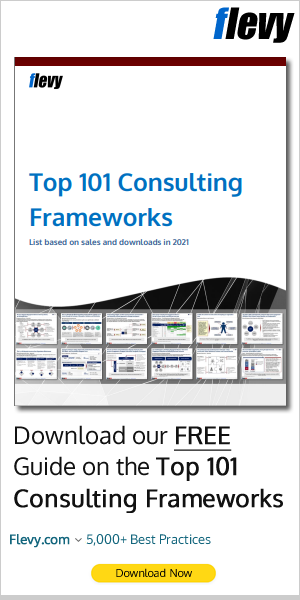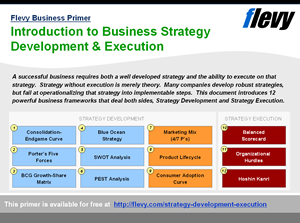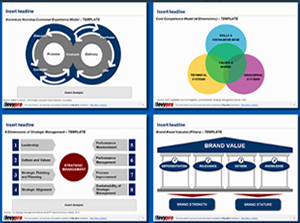Editor's Note: Take a look at our featured best practice, AI in Supply Chain Management: Strategy Paper (219-slide PowerPoint presentation). Unlocking the Future of Supply Chain Management with AI and Blockchain Introduction Welcome to the comprehensive guide on revolutionizing Supply Chain Management through the power of Artificial Intelligence (AI) and Blockchain technology. This strategy paper, presented across a massive [read more]
Can Hiring from Adjacent Sectors Pull Your Company out of a Supply Chain Slump?
Also, if you are interested in becoming an expert on Supply Chain Management (SCM), take a look at Flevy's Supply Chain Management (SCM) Frameworks offering here. This is a curated collection of best practice frameworks based on the thought leadership of leading consulting firms, academics, and recognized subject matter experts. By learning and applying these concepts, you can you stay ahead of the curve. Full details here.
* * * *

As companies seek to alleviate their unique supply chain woes, it’s worth looking to adjacent sectors. Tapping the expertise of supply chain managers from different sectors could mean shining a light on solutions that offer stability to companies in similar situations.
Here’s a look at some of the areas of expertise that translate across sectors, and how they can help companies overcome a supply chain slump.
Intermodal Transport
If your company engages in import-export, the nature of your intermodal transportation operations are in disarray. Port backups and freight delays, coupled with historic intermodal transport prices, has decimated the domestic leg of supply chains for many businesses. And while it may seem like every company has the same problem, slight variance in considerations across sectors sheds light on potential solutions.
For example, hiring an executive used to dealing in rail freight could open the door to a new mode of transportation if you’re currently struggling to move containerized freight via truck. Likewise, bringing in an executive used to dealing with a certain freight class can realign your logistics around more strategic policies designed to maximize shipment efficiency.
Talented supply chain executives will have the ability to take their experiences from one sector and apply them to another, making modifications specific to the unique challenges of that sector.
Supply Chain Restructuring
For many companies, now’s the time for supply chain restructuring. It’s an opportunity to lay the foundations of new supply chains—a process that can benefit from sector-adjacent expertise.
Often, it’s as simple as recruiting supply chain executives who have experience dealing with certain regions of the world or with specific types of materials. In other cases, tapping supply chain insights from another sector means getting experience from someone who can build synergistic relationships or anticipate cyclical value streams. For many companies, it’s an opportunity to hire supply chain experts who are deeply familiar with new challenges based on their own past experiences.
It’s also important to understand the value of new perspective when structuring new supply chains. As businesses reel from the distortion or collapse of their current supply chains, they need surety in the future. Combining best practices, lessons learned and new perspectives into a concerted effort to rebuild is a step in the right direction for companies feeling the squeeze.
Supply Chain Management
More and more, supply chain isn’t sequestered or siloed within company operations. It’s becoming an integrated part of total value stream operations, which makes visionary leadership important. How can you integrate supply chain into broader company operations? More important, how can you modernize supply chain ops to maximize the value of these synergies?
Cross-sector supply chain specialists have an advantage here. They see beyond supply chain structure, understanding how it affects decision-making within organizations. Their familiarity with different supply chain complexities helps inform a top-level look at where supply chain fits into various aspects of operation. As a result, they’re better at seeing the bigger picture, no matter what challenges are present or what the nuances of a company’s supply chain might look like.
Perhaps most important is the ability to leverage cross-sector experience into team-building. The people who manage supply chains are as integral to them as the infrastructure. Leaders with diverse expertise have the advantage of being able to structure teams and guide management to align with standards and best practices already proven by other companies.
How to Hire from Adjacent Sectors
Right now, as supply chain struggles persist, leadership is more difficult than ever to find. Looking outside of a specific sector or vertical not only opens the door to diverse talent, but a larger talent pool. Nevertheless, supply chain experts remain in high demand.
Start your search in immediately adjacent sectors. If you’re in tech component procurement, look for professionals with a chemical supply chain background. If you’re struggling to re-establish construction supply chains, considering hiring someone with materials expertise. Directly adjacent sectors have more overlap than many businesses realize—and the differences become differentiators quickly.
To rebuild, overcome and safeguard against supply chain disruptions, companies need to restructure their own internal supply chain ops. It starts at the top, with supply chain managers and executives who don’t only have supply chain experience, but also cross-sector experience and familiarity. After all, de-siloed supply chain ops demand someone who can think outside of the immediate challenges facing a company and apply peripheral knowledge to effect lasting, viable solutions.

Want to Achieve Excellence in Supply Chain Management (SCM)?
Gain the knowledge and develop the expertise to become an expert in Supply Chain Management (SCM). Our frameworks are based on the thought leadership of leading consulting firms, academics, and recognized subject matter experts. Click here for full details.
Supply Chain Management (SCM) is the design, planning, execution, control, and monitoring of Supply Chain activities. It also captures the management of the flow of goods and services.
In February of 2020, COVID-19 disrupted—and in many cases halted—global Supply Chains, revealing just how fragile they have become. By April, many countries experienced declines of over 40% in domestic and international trade.
COVID-19 has likewise changed how Supply Chain Executives approach and think about SCM. In the pre-COVID-19 era of globalization, the objective was to be Lean and Cost-effective. In the post-COVID-19 world, companies must now focus on making their Supply Chains Resilient, Agile, and Smart. Additional trends include Digitization, Sustainability, and Manufacturing Reshoring.
Learn about our Supply Chain Management (SCM) Best Practice Frameworks here.
Readers of This Article Are Interested in These Resources

|
|
Excel workbook
|
|
24-slide PowerPoint presentation
| |||
About Shane Avron
Shane Avron is a freelance writer, specializing in business, general management, enterprise software, and digital technologies. In addition to Flevy, Shane's articles have appeared in Huffington Post, Forbes Magazine, among other business journals.
Top 10 Recommended Documents on Supply Chain Management
» View more resources Supply Chain Management here.
» View the Top 100 Best Practices on Flevy.













